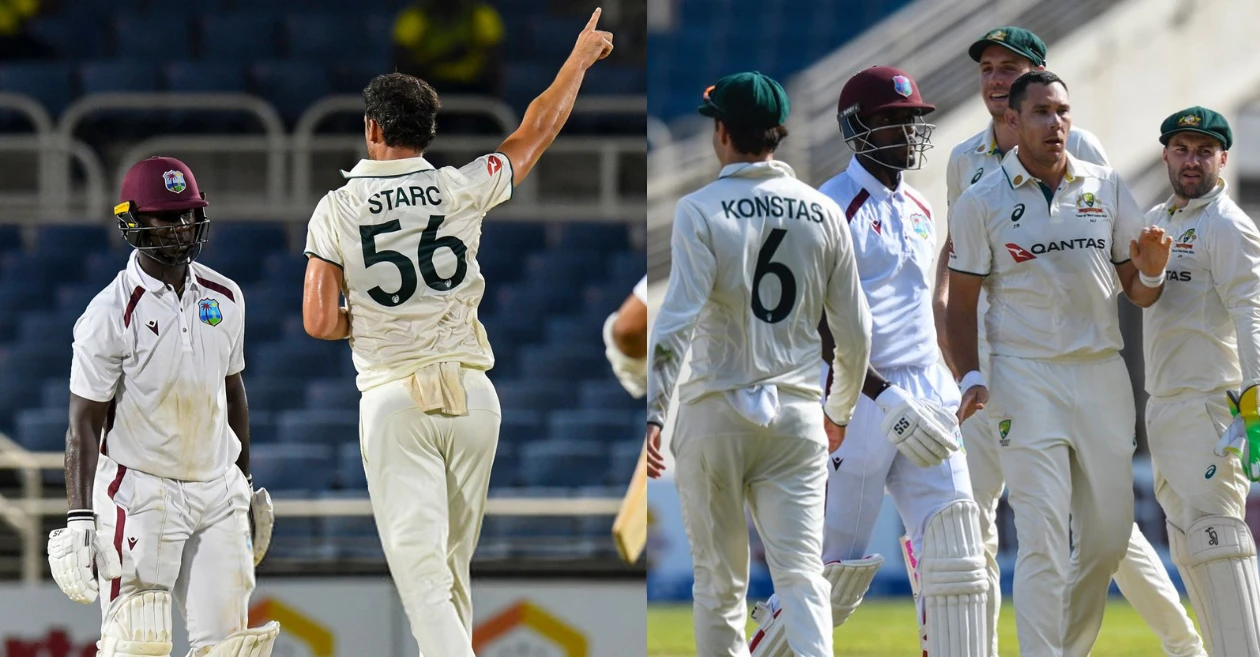Table of Contents
Test cricket, the sport’s most demanding format, has produced countless moments of brilliance and heartbreak. Among its most humbling records are the lowest team innings totals—occasions when world-class line-ups have crumbled under relentless bowling, unplayable conditions, or sheer pressure. The West Indies, a team with a storied legacy, have both inflicted and suffered such collapses.
Five lowest innings totals in Test history
1. New Zealand – 26 all out vs England (Auckland, 1955)
- Date: March 25, 1955
- Venue: Eden Park, Auckland
- Opponent: England
The lowest ever Test innings total remains New Zealand’s 26 against England. Facing a formidable English attack, the Black Caps were skittled in 27 overs. No batsman reached double figures, and the match ended in a crushing defeat by an innings and 20 runs. This benchmark for batting collapses has stood unchallenged for 70 years.
2. West Indies – 27 all out vs Australia (Kingston, 2025)
- Date: July 14, 2025
- Venue: Sabina Park, Kingston, Jamaica
- Opponent: Australia
The West Indies’ 27 all out against Australia is now the second-lowest total in Test history and the lowest ever for the Caribbean side. Chasing 204 for victory in the third Test, the Windies were blown away in just 14.3 overs. Seven batters failed to score, and only Justin Greaves (11) reached double digits. Mitchell Starc’s devastating 6/9 and Scott Boland’s hat-trick sealed a 176-run win for Australia and a 3-0 series sweep. The collapse broke a 148-year-old record for the most ducks in a Test innings by a single team.
3. South Africa – 30 all out vs England (Port Elizabeth, 1896)
- Date: February 13, 1896
- Venue: St George’s Park, Port Elizabeth
- Opponent: England
South Africa’s 30 all out against England in 1896 was a product of early Test cricket’s bowler-friendly conditions. England’s George Lohmann took 8-7, decimating the South African line-up. This total set a record at the time and remains one of the most infamous collapses in cricket history.
Also WATCH: Scott Boland becomes first bowler to pick up a hat-trick in Day-Night Tests
4. South Africa – 30 all out vs England (Birmingham, 1924)
- Date: June 14, 1924
- Venue: Edgbaston, Birmingham
- Opponent: England
Nearly three decades later, South Africa matched their own unwanted record, again scoring just 30, this time at Edgbaston. England’s Arthur Gilligan and Maurice Tate ran through the Proteas, reinforcing England’s dominance in the early years of Test cricket.
5. South Africa – 35 all out vs England (Cape Town, 1899)
- Date: April 1, 1899
- Venue: Newlands, Cape Town
- Opponent: England
South Africa’s third appearance in the top five came in 1899, when they could muster only 35 runs at Newlands. England’s bowlers, led by Schofield Haigh, again exposed the vulnerability of early South African batting on treacherous pitches.
Also READ: ENG vs IND – Top 5 Indian openers with most centuries in SENA countries ft. KL Rahul
